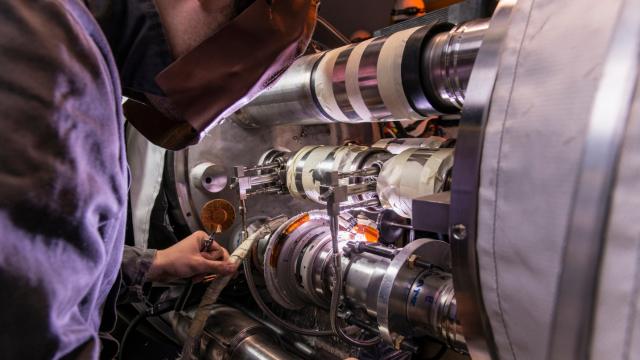The Large Hadron Collider, the world’s largest atom smasher, will be turned off for the next two years for upgrades. Hopefully, its particle-hunting abilities will be even better once it restarts in 2021.
The LHC experiment is the crown jewel of CERN in Geneva, Switzerland. A complex of successive rings accelerate subatomic particles before injecting them into a pair of intersecting rings, sixteen miles around. At each intersection point, a detector acts like a camera to watch the result of the particles crashing together. Scientists used the experiment to discover the Higgs boson, a particle partially responsible for giving other particles mass. Its shutdown and upgrade will hopefully allow physicists to explore new, previously inaccessible frontiers of the universe.
Several parts of the LHC will receive upgrades during this two-year period, also called “Long Shutdown 2.” The injectors that feed particles to the accelerator will be altered to accommodate stronger particle beams, according to a CERN release. The linear accelerators, the first steps of the accelerator process, will be replaced. Other accelerators along the way to the final LHC ring will receive upgrades, as will electrical components. Each of the collision-measuring detectors will see upgrades; one of them, LHCb, will be nearly replaced.
But work will also continue on the the upgrade that will turn the LHC into the HL-LHC, or High-Luminosity Large Hadron Collider.
You may have heard some rumbling about how the LHC hasn’t found any new particles since the Higgs boson. By now, many physicists were hoping to have seen evidence of “supersymmetry,” a list of partner particles for each existing particle that would help explain several outstanding physics problems at once, and could be a candidate for explaining dark matter. But supersymmetry remains undiscovered. Now, physicists are trying to find new leads in other ways, by searching for rarer outcomes of particle collisions and deviations from the Standard Model of particle physics The HL-LHC would increase the collision rate by five to seven times, to make any abnormalities more obvious.
All of this renovation doesn’t mean science will stop at the LHC. The detectors merely collect data—but it’s up to scientists to dig through the data in order to find something new. Physicists are still sifting through the 2015-2018 run.
The LHC is scheduled to restart in 2021, and the HL-LHC project should begin in 2025.
